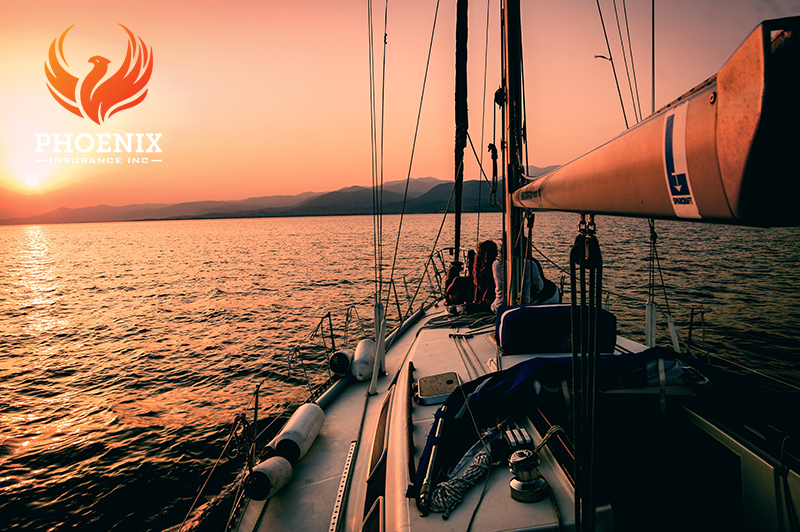More Americans than ever are finding fun and relaxation on the water; on power boats, sailboats, personal watercraft and every other means of flotation known. From wakeboarding to bass fishing, boaters are enjoying the great outdoors along with activities that promote healthy living and the building of communities. Whether you’ve just purchased a boat for the first time or you’re a lifelong boat owner, it pays to look into your insurance coverage and ensure that you’re properly protected while on the water. Or even on land, for that matter.
For insurance purposes, boats are pretty similar to cars; you need liability coverage in case you or your passengers cause injury to someone else, comprehensive coverage to fix or replace your boat in the event of an accident or total loss, and underinsured (or uninsured) coverage in case the person who causes damage to you or your boat doesn’t have adequate coverage in place. So far, pretty similar to auto insurance, but with a boat there are a few uniquely additional issues that need to be considered.
First, there’s the issue of an accident or breakdown far from home. When something like that happens with your car, you’re generally able to call a tow-truck to take the car directly to the repair shop. But with a boat, sometimes many miles from tour home port, how do you get timely help and a tow? Maybe the Coast Guard or a Good Samaritan can help you get to a safe anchorage or a dock near where you broke down, but how do you get the boat to the repair shop of your choice far from home?
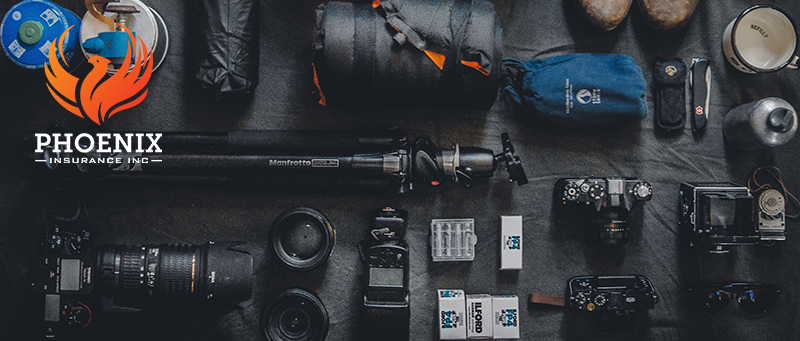 The other important consideration for boats is the amount of temporary, detachable and personal gear that can be lost due to theft or accident. Marine electronics can cost in the thousands, evens tens of thousands for GPS, Chart Plotters, Radar, Autopilot, VHF Radios and other must-haves. Add to that the cost of life jackets, fishing gear, anchors, lighting, mobile phones, stereo systems, TVs, barbecue grills, and the cost of replacing these items can easily be higher than to replace the boat itself.
The other important consideration for boats is the amount of temporary, detachable and personal gear that can be lost due to theft or accident. Marine electronics can cost in the thousands, evens tens of thousands for GPS, Chart Plotters, Radar, Autopilot, VHF Radios and other must-haves. Add to that the cost of life jackets, fishing gear, anchors, lighting, mobile phones, stereo systems, TVs, barbecue grills, and the cost of replacing these items can easily be higher than to replace the boat itself.
And finally, owning a boat or personal watercraft often means that you also own a trailer. If you’ve ever seen a family at the side of the road with a boat sitting on a trailer missing one or more wheels in the heat of the summer, you know that the humble little trailer can really cause you to have a bad day. Getting the boat off the broken trailer and home safely, while also retrieving the trailer itself can involve cranes, big tow-trucks and a lot money.
So, when you think of boat insurance you really need to think of the multiple dimensions of risk, liability and practicality. Not just what happens if you accidentally injure someone, or run into someone’s dock, but how are you going to get home? How will you replace the gear that you’ve spent years adding to the boat or accumulating? Who’s going to come to your rescue and render assistance without handing you a multi-thousand-dollar towing bill? That’s where an independent insurance agency like Phoenix Insurance comes in.
First, Let’s Talk Boats
Are you in need of Yacht Insurance, Boat Insurance or Personal Watercraft Insurance? Are you looking for the best insurance for boats, or cheap jest ski insurance? Suddenly buying insurance for a watercraft becomes more complicated. Let’s break down the various types of boats and start narrowing down the insurance options.
Pontoon Boats
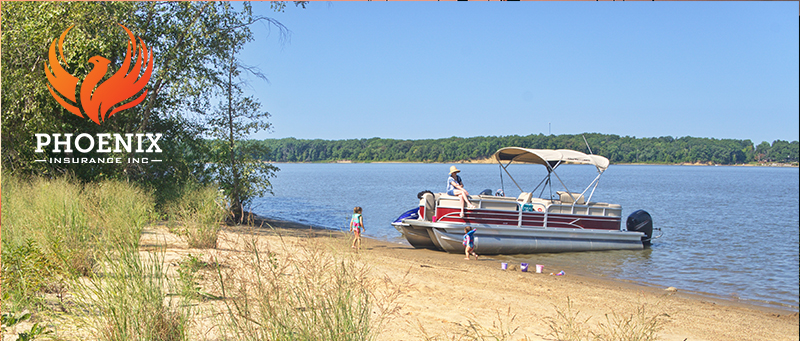 Lightweight and spacious, pontoon boats are the preferred choice of families looking to spend summer days on the lake with something for everyone. A large, flat deck allows for plenty of seating and lounging areas, with comforts like a sink, fridge and grille to prepare meals. Kids can enjoy swimming and tubing, while there’s plenty of time and space for adults to fish, or just relax.
Lightweight and spacious, pontoon boats are the preferred choice of families looking to spend summer days on the lake with something for everyone. A large, flat deck allows for plenty of seating and lounging areas, with comforts like a sink, fridge and grille to prepare meals. Kids can enjoy swimming and tubing, while there’s plenty of time and space for adults to fish, or just relax.
Powerboats
 Saying “powerboat” is kind of like saying “car”; they come in all shapes, sizes and types, each built for a different mission. What they do have in common is a mechanical propulsion system, most often of the internal combustion variety, but ever more frequently of the hybrid and even all-electric type. A powerboat can be everything from a 6-foot dinghy to a 60+ foot yacht. Here are some of the most common configurations in the category:
Saying “powerboat” is kind of like saying “car”; they come in all shapes, sizes and types, each built for a different mission. What they do have in common is a mechanical propulsion system, most often of the internal combustion variety, but ever more frequently of the hybrid and even all-electric type. A powerboat can be everything from a 6-foot dinghy to a 60+ foot yacht. Here are some of the most common configurations in the category:
- Bass and fishing boats
- Bay boats
- Bowriders
- Center consoles
- Cruisers
- Cuddy cabins
- Deck boats
- House boats
- Jet boats
- Ski/wake boats
- Walkarounds
Personal Watercraft
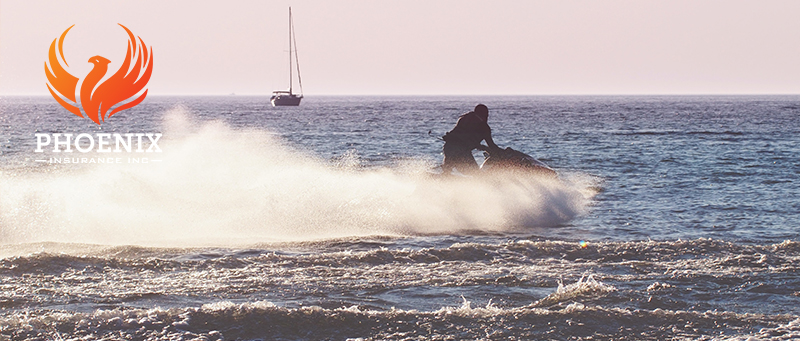 Maybe you’re more familiar with the term Jet Ski, Wave-Runner or SeaDoo. Regardless of what you call it, a personal watercraft is to a boat what a motorcycle is to a car. Fast, flexible and exhilarating is how most people describe them, with powerful engines, incredible maneuverability and a wind-and-water in your face excitement.
Maybe you’re more familiar with the term Jet Ski, Wave-Runner or SeaDoo. Regardless of what you call it, a personal watercraft is to a boat what a motorcycle is to a car. Fast, flexible and exhilarating is how most people describe them, with powerful engines, incredible maneuverability and a wind-and-water in your face excitement.
Sailboats
In the 3,500 years since man first set sail in ancient Egypt, wind has been harnessed to propel every imaginable permutation of boat. Some of these boats are designed for leisurely cruises across a lake while others are fitted for ocean-going in the fiercest seas at top speed. Here are some of the most common types of sailboats in use today:
Catboat
A catboat is a sailboat with a single sail on a single mast set well forward in the bow of the boat. Traditionally they were gaff rigged. Most have a shallow draft, with centerboards, although some have a keel. The hull can be 12 to 40 feet long with a beam half as wide as the hull length at the waterline.
Sloop
A sailboat with one mast is usually a sloop with one mainsail and one headsail. Sloops are also regularly fitted with a bulbous colorful foresail called a spinnaker.
Ketch & Yawl
Ketches and yawls have a secondary mast behind the main one. The ketch configuration places that mizzenmast behind the mainmast but ahead of the rudderpost while the yawl places it behind the post. The second mast is shorter than the main mast. Both of these designs (split rigs) provide more sail area that isn’t reliant solely on the height of the mainmast and therefore can be easier to manage when sailing shorthanded.
Cutter
A cutter rig usually has one mast but two or more headsails. This rig “cuts” the foretriangle between the head (forward) stay and the main mast. Multiple headsails allow for flexible sail combinations in variable wind conditions.
Monohull
Most sailboats have a single hull and use a keel to both balance the center of gravity with the sails, as well as to convert the wind’s pull into forward motion.
Multihull
Catamarans and Trimarans can come in all sizes, from small, ultra-light racing versions to ocean-going yachts that can accommodate several passengers in comfort. Unlike monohulls, multihull boats can use less ballast to balance the sails’ pull and can move more quickly through the water. Likewise, two or three hulls can dramatically increase interior space and offer vast areas of deck space for lounging and equipment storage.
Motorsailers
Just as it sounds, a motorsailer is a cross between a traditional sailboat and a power boat. The combination of the two propulsion systems offers many advantages, including lower operating costs and better stability while under sail, and continued headway when the wind isn’t blowing as well as better maneuverability in close passages and marinas while under power. Far less popular than they once were, motorsailers are still a viable choice for offshore passage-making.
Risks to Boats, Mariners & Their Passengers
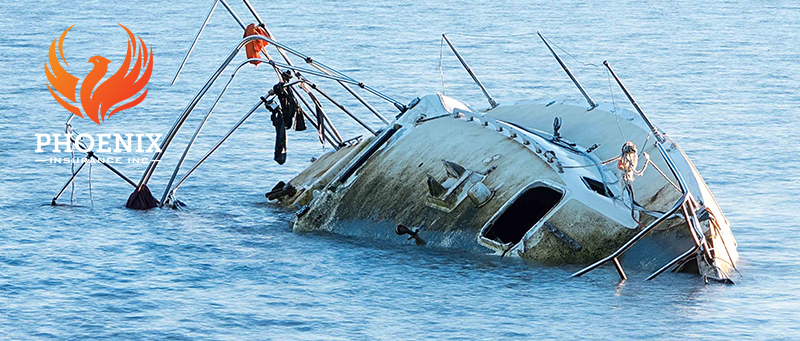 Insurance carriers take a holistic view of the risks that are inherent in operating a boat and offer coverage to offset the costs of loss under each circumstance. Let’s take a look at the specifics of risks to a boat or personal watercraft as noted above.
Insurance carriers take a holistic view of the risks that are inherent in operating a boat and offer coverage to offset the costs of loss under each circumstance. Let’s take a look at the specifics of risks to a boat or personal watercraft as noted above.
Boat Hull Damage
A boat’s hull is what keeps the boat afloat and supports its superstructure, propulsion systems and passengers. Think of the hull as the foundation of the boat, that everything else relies on for support and its operation. Damage to the hull can be life-threatening if severe, allowing uncontrolled ingress of water that can swamp the boat.
But hull damage doesn’t always involve a breech of the hull itself; it can also involve damage to other parts of the boat’s structure, whether visible or not. That’s why a thorough inspection by a qualified marine surveyor is always a prudent measure if the boat has been involved in a collision or a grounding event. Careful inspection may reveal damage that can be addressed early, before it can spread and pose serious risk to the boat and its passengers.
Boat Mechanical Damage
A boat’s mechanical systems can include motors, propellers, transmissions, rudders and tillers, rigging, stanchions, masts and more. While an outboard motor damaged in a collision is an obvious mechanical component that needs to be insured, a radar arch damaged while trailering a boat may be less obvious. In both cases however these are mechanical components of the boat that need to be protected in the event of a collision, theft or fire.
Personal Injury on or by a Boat
Boats pose many risks of injury to people; both those on board as well as others in the vicinity of the boat. The range of potential injuries includes scrapes and scratches, to broken bones, burns, carbon monoxide poisoning, drowning, and more. With the dynamic environment of a moving boat, risk of injury is magnified as the boat gets under way, maneuvers, or approaches a dock. The right personal injury insurance is critically important on a boat.
The first consideration in determining adequate personal injury insurance for a boat is to consider the suitable coverage limit. Remember that if you are found liable for injuries suffered by a passenger or third party, your insurance will only cover damages to the preset limit. Anything above that and you’re likely on your own. So not only is it important to maintain a sufficient limit for personal injury insurance, it’s often an even better idea to ask your agent about an Umbrella policy that can dramatically increase your coverage for very little added cost.
Coverage against Boat Theft
When your boat goes missing—either on the water or on the trailer—is the wrong time to consider the true cost of replacement. As with most boaters, you’ve likely added electronics, safety gear, fishing gear, a dinghy, swim ladder, and other valuables over time. Now that the boat is gone you start to tally up the costs and discover that your theft coverage is only a fraction of what you’ve actually lost.
It’s important to discuss all of these added components with your agent annually. It’s also crucial to understand the difference between Agreed Value and Market Value as they apply to your boat, and select the one that best aligns with your circumstances and expectations. And don’t forget that replacing that boat due to theft will often include taxes, registration fees and repayment of bank loans if there’s anything owing.
Sinking (Wreckage Removal)
When a boat takes on more water than it displaces it will generally sink to the bottom. Sometimes a boat’s hull can be breeched by hitting a submerged object, resulting in the taking on of water that overwhelms the bilge pumps. Other cases of boats sinking at their moorings can be attributed to a through-hull fitting that was not properly secured and a bilge pump that ran down the boat’s battery. In any case, once a boat is submerged, it poses an enormous liability risk and must be removed immediately.
While we never recommend doing so, some cost-conscious boat owners will skip comprehensive coverage for an older boat, arguing that “the insurance costs as much as the boat’s worth”. That is until they realize they’re on the hook for thousands of dollars in salvage fees and possibly thousands more for blocking a public or private dock. Comprehensive coverage goes hand in hand with salvage removal in the event of sinking and both must be specifically added to a boat insurance policy in order to be in effect at the time of loss.
Fuel Spills (Pollution Liability)
You’re out on the lake, run out of gas, and pull out the spare tank to top of the boat’s fuel supply. Just like that, the tank falls into the water and 5 gallons of diesel now shimmer across the lake’s surface. Kids playing in the water get covered in fuel oil, as do birds and aquatic life; needless to say, it’s not going to be a good day.
With the right insurance in place, you can call for help, knowing that professionals will attend immediately, containing the fuel spill and mitigating the damage done to other people and the environment. The right coverage will also protect you in the event that fines are levied by authorities as penalties for causing the fuel spill. This also applies to fuel and dangerous substances pollution in the event of a sinking and is entirely independent of salvage insurance that may not offer any coverage for fuel spills.
Personal Items
Even when you’re out for just a day cruise you’ll likely have hundreds if not thousands of dollars in personal items with you. A backpack, laptop, wallet, smartphone, prescription glasses, the keys to your car, a towable tube; even these few items can represent $2-4,000 in losses. How do you get home and unlock the door? What happens to the laptop you need for school or work?
Even when you think you’re traveling light, the costs can add up. And don’t count on your homeowner policy to cover these items because most do not. Consider covering your personal items based on who’s going to be on your boat and what it will cost you to replace all of the items you and your guests bring along. You’ll likely be surprised to see how much it actually adds up to.
Fishing Gear
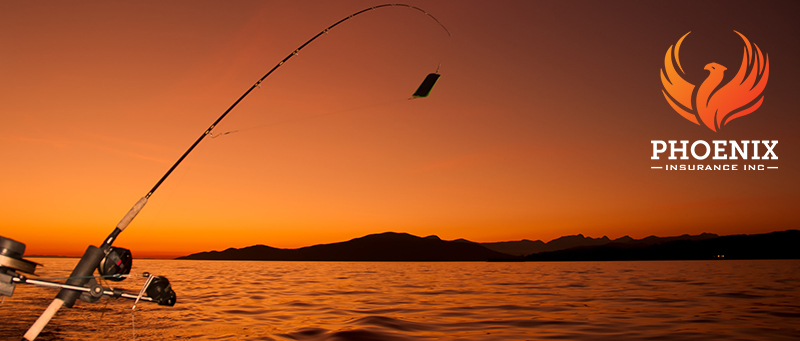 It’s not uncommon for fishing reels and rods to cost upward of $300 each; some go way beyond that even. What you have collected over the years in reels, rods, lures, fillet knives, downriggers and crab traps could represent thousands in replacement costs. Don’t leave your gear unprotected, speak with your agent and do a thorough inventory of all the gear, including tackle boxes, that you keep on your boat.
It’s not uncommon for fishing reels and rods to cost upward of $300 each; some go way beyond that even. What you have collected over the years in reels, rods, lures, fillet knives, downriggers and crab traps could represent thousands in replacement costs. Don’t leave your gear unprotected, speak with your agent and do a thorough inventory of all the gear, including tackle boxes, that you keep on your boat.
Fire
Next to a vessel taking on water, a fire on the water is not only frightening, it poses a life-and-death risk. Our first advice to boat owners is to double the number of firefighting devices prescribed by the Coast Guard for your vessel, and ensure that those devices are accessible from several positions on the boat. A fire extinguisher located in the engine compartment is of no use when the engine is on fire, so ensure that you have the ability to get to and use a fire suppression device regardless of where the fire starts on the boat.
Whether wood or Fiberglas, a boat’s hull is highly combustible and can quickly overcome any attempts of suppression. Onboard fuel tanks for motors, barbecue grills, cooktops and other appliances can accelerate the spread of fire and place the boat and its occupants in peril withing minutes. The best defense against a fire on a boat is prevention, followed by a carefully planned, stocked and practiced suppression and escape plan.
Emergency Assistance (Towing & Fuel)
A breakdown on the water can range from minor inconvenience to life-threatening depending on your location, the weather and the time of day. A common occurrence for power boaters is running out of fuel, or damaging a propeller or outdrive, rendering the boat immobile. Whatever the cause of the breakdown, trying to get to shelter and safety in rough weather conditions with fading daylight can be scary and dangerous.
Many boaters believe that if they break down or run out of fuel, they can simply call the Coast Guard for a tow. That’s almost always not the case, as the Coast Guard’s mandate is not to render towing or mechanical service to mariners, but rather to prevent the loss of life in the direst of circumstances. Your boat washing up on a rocky beach after running out of fuel does not qualify as a dire circumstance.
Several of our marine carriers now offer a form of “roadside service” for boaters. And depending on the carrier, this service can protect you both on the water and on the road to and from the water. In the former case, the insured can place a call (by phone or VHF radio) to a special number to have a service vessel dispatched to their location. In the event of a breakdown on the way to the water, either towing a boat on a trailer or just headed to a docked boat, the service can meet you on the road.
Storm (Damage & Rescue)
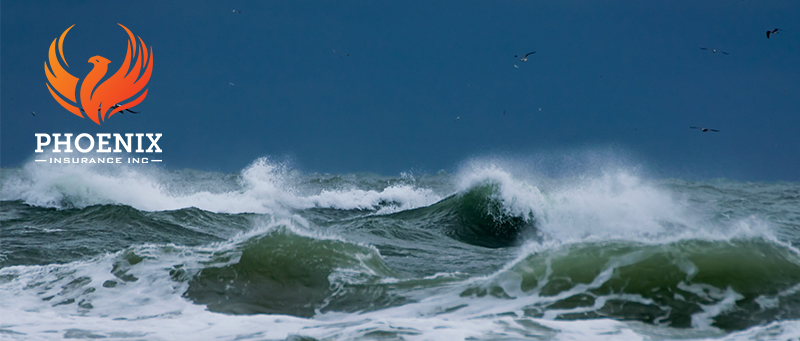 The Pacific Northwest is blessed with temperate weather and countless islands, coves and fjords protected from the Pacific’s often tumultuous waters. In contrast to other parts of the country it is rare that local boaters experience severe weather events inland, or offshore. That said, it is not uncommon for minor weather systems to pass through an area with strong winds, rain, hail and sometimes lightning strikes.
The Pacific Northwest is blessed with temperate weather and countless islands, coves and fjords protected from the Pacific’s often tumultuous waters. In contrast to other parts of the country it is rare that local boaters experience severe weather events inland, or offshore. That said, it is not uncommon for minor weather systems to pass through an area with strong winds, rain, hail and sometimes lightning strikes.
Storms can catch boaters by surprise, especially as they make passage at the close of a weekend when all occupants are eager to get home. As with other calamities, preparation and planning are often the best ways to mitigate the risks posed by inclement weather. Having the right safety gear on board including both ground & sea anchors, monitoring marine weather reports and ensuring that your navigation and communications equipment are functional and redundant will go a long way toward protecting your boat and passengers in rough weather.
The other important component of safety in rough weather is to know your boat and crew’s limitations and stay well within them. Everyone can get caught in a sudden turn of the weather, so be prepared to call for help or a tow if the conditions warrant it. With the right kind of insurance in place you can rely on the professional for assistance without facing an unwelcome and significant bill for service rendered.
Coverages
This is where your Phoenix Insurance licensed agent really shines. Selecting and recommending the right coverages is the difference between getting professional advice and going it alone. Here’s a selection of coverages that your agent may suggest depending on your boat, experience and activities:
Agreed Value Coverage
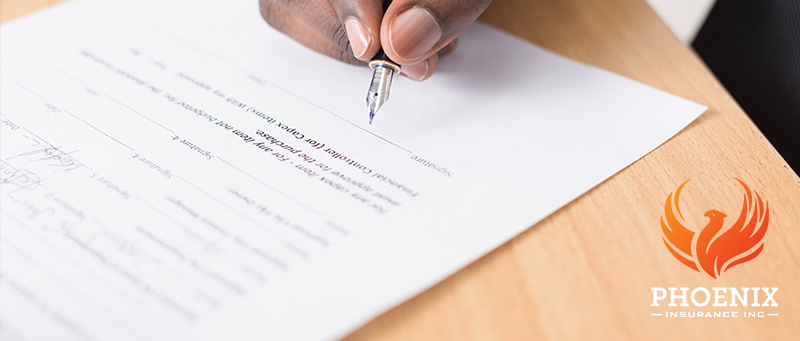 A watercraft insurance policy with damage coverage can be for an agreed-upon value of the boat and motor. For example, if your boat could be replaced with a similarly equipped boat of the same vintage for around $6,000, you may opt to agree on that value if your boat is deemed a total loss due to theft or collision. Since most boats maintain their value for a long time, agreed value coverage makes sense for many boaters.
A watercraft insurance policy with damage coverage can be for an agreed-upon value of the boat and motor. For example, if your boat could be replaced with a similarly equipped boat of the same vintage for around $6,000, you may opt to agree on that value if your boat is deemed a total loss due to theft or collision. Since most boats maintain their value for a long time, agreed value coverage makes sense for many boaters.
Full Replacement Cost Coverage
With comprehensive and collision coverage, the carrier will pay whatever it takes to return your boat to its pre-accident condition. As an example, if your 10-year-old outboard motor is damaged beyond repair from hitting a submerged rock, the carrier will pay the full cost of $7,000 to replace it, even though it may only be worth $3,000 after depreciation.
Bodily Injury & Property Damage Liability (BI/PD)
Just as they sound, Bodily Injury Liability covers you if you’re liable for injuries suffered by your passengers or others in a boat accident, while Property Damage Liability pays to repair or replace other people’s property that you damage, plus any legal fees.
Boat Fuel Spill Coverage
A Boat Insurance policy should always include coverage for fuel spills, no matter how they happen. Since fuel spills involve on-the-water containment measures and environmental impact issues, costs can soar rapidly even with modest amounts of fuel spilled. The right policy will cover these costs up to the stated limits.
Boat Wreckage Removal Coverage
Notwithstanding issues related to fuel spills, a boat that sinks may need to be removed if it’s blocking a dock or a channel. With this coverage in place the carrier will pay for the removal so you can avoid any fines that may be levied by the marina or local authorities.
Roadside Assistance
If you trailer your boat, Roadside Assistance is coverage you can’t do without. The right coverage will cover the cost of retrieving your tow vehicle, as well as the trailer and boat. In some cases carriers will also include trip interruption and accommodation costs, so ask your Phoenix Insurance agent about coverage that best matches your circumstances.
Water Sports Coverage
Injuries related to water sports may not be covered under your boat policy, even if you have bodily injury coverage. Because water sports pose added risks and potential for injury, you’ll need to ensure that this coverage is in place if you or your passengers take part in such activities.
Total Loss Replacement
Just as with automobiles, Total Loss Replacement (TLR) coverage is intended to make you whole in the event of a total loss of a reasonably new boat. In most cases you need to be the original owner and purchase the coverage within the first year of ownership. With TLR in force, you choose between receiving what you paid for the boat or have the insurance carrier buy you a new one!
Fishing Equipment or Carry-on Items
While every carrier is different, the right coverage will pay you what it costs to replace lost fishing gear and personal property, with no depreciation! That means if $5,000 worth of fishing gear is stolen from your boat, you’ll get $5,000 to replace it, not the $3,000 it was worth when stolen.
Mechanical Breakdown Coverage
Typically, insurance won’t pay to repair or replace an outboard motor or an inboard/outboard if it just breaks down because of age or wear and tear. But select carriers offer a low-cost optional coverage that will do just that; pay to have the broken-down engine/drive repaired or if it can’t be repaired, replaced outright!
Comprehensive & Collision
These are two separate coverages. Comprehensive covers things out of your control, like the theft of your boat, vandalism, a sunken boat, fire, extreme weather, hurricanes, and other damage. Collision covers damage from boating accidents, such as hitting a submerged object, dock, another boat, and can even cover injuries to pets on your boat.
Uninsured/Underinsured boater (UB/UIB)
Similar to auto insurance, this coverage will kick in if you’re hit by another boat with no insurance or too little insurance. The carrier’s policy will pay for your injuries up to the policy limit.
Medical Payments
Accidents can happen on a boat, so Medical Payments coverage acts as a backstop to expensive medical bills that your health insurance might not cover because you haven’t reached your deductible. With this coverage in place, your carrier will pay those medical expenses with zero deductible.
Pet Insurance
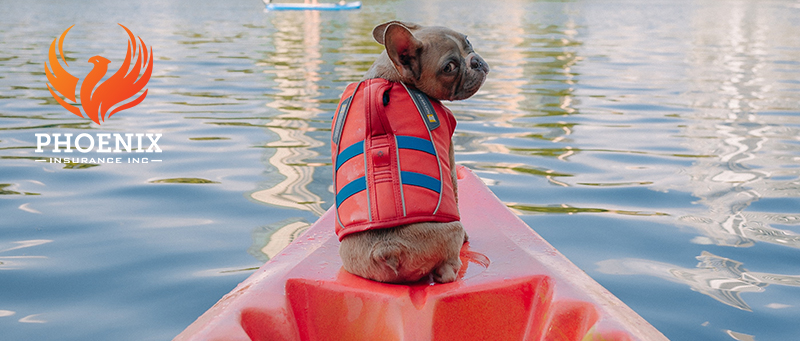 If you take your fur buddy along on the boat then this coverage will cover veterinary bills or provide death benefits should the worst happen. And, unlike standard pet insurance, this coverage is expressly designed for accidental injuries, not illness.
If you take your fur buddy along on the boat then this coverage will cover veterinary bills or provide death benefits should the worst happen. And, unlike standard pet insurance, this coverage is expressly designed for accidental injuries, not illness.
Trailer Trip Interruption
For a very modest amount in annual premium, this coverage can offset the costs of food, hotel and transportation costs you incur if you break down 100 miles or more away from home. A good addition for snowbirds who take their boats to sunnier climes or those who trailer to a favored cruising spot.
Rate & Coverage Factors
Location
Watercraft insurance is generally more expensive if you boat in a coastal state. You may pay less for boat insurance in states where boating is not a year-round activity.
Boat type
The year, make, and model of your watercraft will affect your policy’s cost.
Boating history
Experienced boaters are less likely to have an accident on the water and will often pay less for boat insurance compared to inexperienced boaters.
Prior claims
If you have a history of boat insurance claims, you could pay more to insure your boat and for liability protection.
Multi-policy
Have an auto, RV, motorcycle, homeowners, renters, condo, or commercial policy with Progressive? We’ll say thank you by lowering your price.
Responsible Driver
If you have no watercraft or motor vehicle violations or accidents on your record for the last three years, you can significantly lower your boat insurance rate.
Original Owner
If you’re the original owner of your boat and your policy’s coverages include comprehensive and collision, you can receive a discount.
Transfer from another company
If you already carry boat insurance, you’ll get a discount for switching carriers.
Affinity Group Association
In some cases, you can earn a discount for membership in the United States Coast Guard Auxiliary (USCG) or United States Power Squadron (USPS). In most states, USAA members will also receive a discount.
http://www.cgaux.org/boatinged/
https://americasboatingclub.org/index.php
Multi-boat
Earn a discount if you have more than one boat on your policy.
Advance quote
Get rewarded for shopping in advance! You’ll earn a discount if you purchase your boat policy at least one day prior to when it goes into effect. The discount amount increases if you buy a policy more than a week before it is scheduled to start.
Pay in Full
Get a discount just for paying your boat policy up front and in full.
Prompt Payment
You’ll earn this discount starting with your first Progressive boat policy, and you’ll keep it as long as you pay on time.
Safety Course
Just complete any state-approved safety course to save even more.
Boat Equipment Credits
Some carriers will offer discounts when you have certain equipment onboard, such as GPS, radar, CO2 detectors and alarm systems. These can help save you money on boat insurance.
Large Yacht Lay-Up Discounts
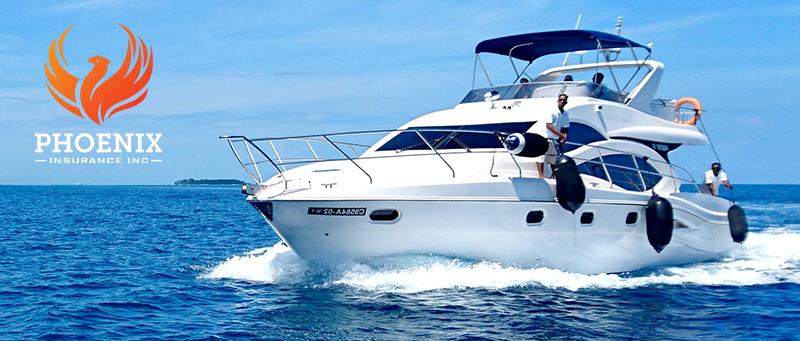 Own a yacht that is laid-up for part of the year? Carriers offer discounts for times your vessel is decommissioned.
Own a yacht that is laid-up for part of the year? Carriers offer discounts for times your vessel is decommissioned.
Accident Forgiveness
Carriers offer both small and large accident forgiveness that protects your rate from increasing if you should have an at-fault claim. This can benefit both new boat owners as well as seasoned boaters.
Disappearing Deductibles
Offered on auto policies, some carriers also offer this amazing perk to boat owners. Every claim-free year reduces your deductible amount, in some cases by 25% per year! That means you could start with a very affordable $1,000 deductible and in four claim-free years pay $0 deductible!
Limitations
As with everything, there are limitations to eligibility and coverage amounts you need to be aware of. Here’s a sample of those limitations but you should consult with your Phoenix Insurance agent for all restrictions:
Boat Types
Not all boat types are accepted by all carriers. Examples include airboats, hovercraft, amphibious land craft and any boats that do not meet U.S. Coast Guard standards.
Boat Size
Mainstream carriers have strict limits on the size of a vessel they will insure. Some will insure up to 50 feet while others set 60 feet as their maximum, where others will only insure smaller boats. Phoenix Insurance is able to write policies for any private vessel through our underwriting affiliates.
Boat Value
Carriers will typically place coverage limits on vessels based on size and age. Again, Phoenix Insurance can write policies for any privately-owned and operated vessel through our international affiliate network.
Conclusion
A boat is much more than a financial investment, it’s an emotional commitment. As boat owners we’ve all experienced joyous moments on the water and made memories that will last a lifetime. Protecting your investment in a boat is only a small part of the insurance picture. The right boat insurance will make getting out on the water more fun, knowing that no matter what, you’re covered. Let Phoenix Insurance protect you and your loved ones with the best boat insurance for your specific needs.
FAQ
Here are some of the questions we’re asked most frequently about Boat, Yacht and Personal Watercraft insurance.
What does Boat Insurance Cover?
Boat insurance can cover as little as liability—in you cause an accident or injure someone—all the way to the boat, its contents and the medical expenses of all the people aboard in the event of injury. In addition, boat insurance can cover electronics, fishing gear, the boat’s motor and even towing service on the water. A licensed agent can help you choose the right boat insurance for your needs & circumstances.
What is the average cost of boat insurance?
There’s really no such thing as an average cost for boat insurance because boats and their owners vary so much. While some carriers may advertise that they’ll insure your boat for as little as $100 a year, that rate may only offer a small amount of liability coverage, so if your $20,000 is wrecked or stolen, you could receive nothing from the insurance company. The best way to find out what it’s going to cost for boat insurance is to speak with an agent who has access to many carriers and can offer you the best solution for your needs.
Does boat insurance cover theft?
It depends on your policy. If you have Comprehensive coverage, you could be reimbursed if the boat is stolen. How much you receive from the insurance company depends on your policy; you could get an agreed value, or a market value, or under certain circumstances total replacement value. Keep in mind however that unless you have specific coverage for these items, fishing gear, electronics and personal property on the boat may not be covered.
Do I need to have boat insurance in Washington state?
Washington state does not mandate compulsory boat or watercraft insurance. That said, any activity that puts you at risk of financial loss and exposes you to potential liability is cause for insurance protection. Exactly how much insurance you need depends or many factors, including the value of your boat and other personal assets you need to protect in case of any claims against you.
Can I get a boat insurance quote online?
Absolutely, you can get a boat insurance quote online and buy the policy right on the carrier’s website. Just keep in mind that as with any purchase, unless you shop around, you may not get the best product at the best price. Getting multiple quotes from multiple insurance carriers is time-consuming for consumers, so the best advice we can offer is to see an independent agent who has the tools to shop your policy needs across several carriers and give you the best deal.
Do you really need to have boat insurance?
We often hear consumers question the value of an insurance policy on their boat because the boat may not be worth much. But boat insurance isn’t just about replacing the boat in case of loss, it’s about the liability you can be exposed to if you damage someone else’s property or injure someone. It’s also about protecting you and your passengers from unexpected medical costs in case of injury, or towing you back to shore in the event of a mechanical breakdown. Any time, there’s risk, it’s a good time to consider insurance.
Which company is best for marine insurance?
Phoenix Insurance represents several carriers that offer highly competitive insurance products for boats, yachts and personal watercraft. Each one of these carriers have criteria and specialized products designed around the needs of consumers across several data points, most closely aligned with their target customer. While you can buy a boat insurance policy from any carrier, it’s often best to have your agent check on potential perks and discounts from your existing car and home carrier first. Then, you can make an informed decision about which carrier offers you the coverage you need at a price you’re happy with.
Should I buy Progressive boat insurance?
Phoenix Insurance proudly offers Progressive boat insurance, along with coverage from Safeco, Travelers, and several other tier-1 carriers. And while Progressive offers several boat insurance options that add value, we’ll never suggest that one carrier is best for your needs until we have a clear picture of what those needs are.
What does insurance cover on a jetski?
As a minimum, jet ski insurance should provide liability coverage in the event you damage someone’s property or cause bodily harm. Your agent can help you choose a liability limit that adequately protects you and your assets in the event of a claim, and may even suggest an umbrella policy as a low-cost means of giving you the cushion you might need. And, with personal watercraft now costing up to $20,000, you’ll want to also have comprehensive coverage in case of theft or total loss.
Does my house insurance cover my boat?
Homeowner policies vary by carrier, but as a rule even those who do cover boats do so only for small watercraft like kayaks and row boats, with values of under $1,500 or less. Note also that while these watercraft may be covered in the event of theft, your home’s liability coverage does not generally extend to your use of these boats. Ask your agent to check on the exact coverage offered by your home’s carrier and supplement any shortfalls with a dedicated boat insurance policy.
Should I just buy the cheapest jet ski insurance?
As with everything in life, you get what you pay for with jet ski insurance. Or any insurance for that matter. Carriers are in the business of spreading out risk based on massive amounts of data about theft, accidents and resultant claims, and their rates reflect those risks. So, when you buy a “cheap” insurance policy, recognize that you’re paying the going rate for some insurance, but obviously omitting some other insurance.
What insurance do you need for a yacht?
While there is no standard definition for the term, a Yacht conjures images of the mega-boats that ply exotic locales. In fact, experts refer to any vessel used strictly for pleasure or recreational purposes as a Yacht. Here in the Pacific Northwest, we generally view power or sailboats over 30-40 feet as yachts, with those over 50 feet justly earning the moniker. Larger boats aren’t just more expensive to purchase, they’re also a lot more expensive to maintain because they carry a lot more equipment like generators, watermakers, satellite communications systems, fire suppression systems, dinghies and more.
A larger boat also generally has a deeper draft, requiring extra care when navigating in shallow waters. And should a yacht be damaged or broken down, towing it to a repair station can be a lot more complicated and expensive. Finally, ocean-going yachts are also subject to international rules surrounding safety and licensing, with potential liability when navigating in foreign waters. For these and other reasons, larger boats, or yachts, require a detailed assessment by your agent before a comprehensive insurance package is recommended.
Ready to get Started?
Check out our Boat Insurance page for more details or Contact Us to get started with a quote for boat, yacht and personal watercraft insurance. Thanks, and we’ll see you on the water!
E&OE. All trademarks are trademarks or registered trademarks of their respective owners and are used here in accordance with the fair use doctrine of the US Copyright Act. This is work is Copyright © 2022 Phoenix Insurance Inc. – All rights reserved.

